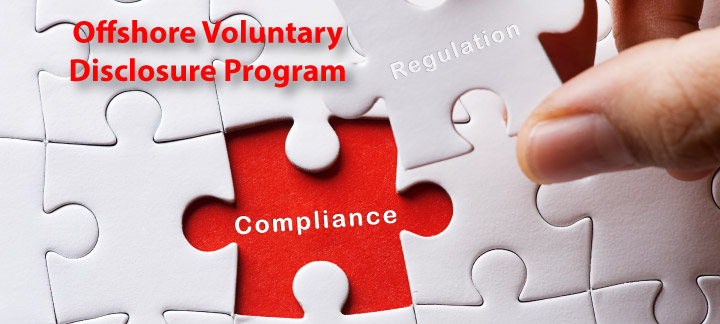What are the requirements of the Offshore Voluntary Disclosure Program?
In order to properly and completely qualify for the Offshore Voluntary Disclosure Program, you must take certain steps and provide specific information to the IRS. It is critical to realize that the disclosure of this information is already mandatory according to US law, and a failure to do so can result in severe financial penalties and criminal prosecution if the IRS learns about undisclosed income and assets through their own means. Conversely, acceptance in the Offshore Voluntary Disclosure program will provide safe harbor against any criminal prosecution based on previously undisclosed foreign income and assets.
Recently the US Department of Justice has made an aggressive push into international tax matters and this has resulted in a rapidly increasing number of FACTA agreements between the US Department of Justice and foreign nations. The IRS now has unprecedented ability to identify these previously undisclosed accounts. Therefore, the Offshore Voluntary Disclosure program has recently seen a massive increase in applications. In this article we will explore the requirements of the Offshore Voluntary Disclosure program.
You Must Provide Copies of Tax Returns and Amended Tax Returns
First, you must provide copies of previously filed tax returns for the years that are covered under the Offshore Voluntary Disclosure Program. Since these previously filed tax returns presumably do not contain the correct information about your undisclosed foreign assets and accounts, you must also file amended tax returns for the years covered under the Offshore Voluntary Disclosure Program. In these amended tax returns, you must also include applicable schedules detailing the amount and type of previously unreported income or assets from the offshore accounts or entities. Depending on the type of unreported income, you may use a Schedule B (for interest or dividends), Schedule D (for capital gains and losses), Schedule E (for income from partnerships) or a Form 8938 (the Statement of Specified Foreign Financial Assets).
You Must File an FBAR Form
The next step of applying for the Offshore Voluntary Disclosure Program is that you must report your offshore accounts to the IRS through amended offshore-related information returns. You will have to complete an FBAR form for the tax years covered by the voluntary disclosure.
You Must Cooperate in the Voluntary Disclosure Process
In order to successfully participate in the Offshore Voluntary Disclosure Program, you must cooperate with the IRS throughout the process and provide the information requested. This means that you must provide information to the IRS regarding all your offshore accounts. You will also have to sign an agreement to extend the period of time that the IRS has to assess Title 26 liabilities and FBAR penalties. Once you complete your Offshore Voluntary Disclosure Program application, it will be forwarded to the Criminal Investigation department of the IRS, who will then determine whether to accept or reject your application.
What Should I Do if My Voluntary Disclosure Application is Accepted?
If the Criminal Investigation department accepts your application for offshore voluntary disclosure, you will receive a letter requesting a full voluntary disclosure within 90 days of the date of the letter. This submission must include a check payable to the Department of the Treasury containing the total amount of tax, interest, accuracy-related penalty, and any other applicable penalties for the entire voluntary disclosure period. This check must be sent along with information identifying the name of the taxpayer, taxpayer identification number, and the years to which the payment applies.
You may also have to include information in addition to the payment and the other items listed above. First, you must provide a completed Foreign Account or Asset Statement for each undisclosed foreign account or asset during the applicable voluntary disclosure period. Next, you will have to submit copies of offshore financial account statements showing all account activity for each of the tax years covered under the voluntary disclosure.
How a Tax Attorney Can Help with the Offshore Voluntary Disclosure Program
If you have a foreign account which you have not disclosed to the IRS, your pre-emptive voluntary disclosure should be handled by an experienced tax attorney. The IRS will try to extract the maximum amount of penalties and fines from taxpayers who failed to disclose foreign assets, but an experienced tax attorney can negotiate with the IRS to minimize those amounts. A tax attorney experienced in offshore compliance will ensure that your accounts are compliant moving forward, something that the IRS will want you to demonstrate. Finally, a tax attorney experienced in dealing with the IRS can help you avoid criminal prosecution.
The Tax Lawyer - William D. Hartsock has been successfully helping clients comply with U.S. International Tax Laws and deal with issues related to worldwide taxation since the early 1980s. Mr. Hartsock offers free consultations with the full benefit and protections of attorney client privilege to help people clearly understand their situation and options based on the circumstances of their case. To schedule your free consultation simply fill out the contact form found on this page, or call (858) 481-4844.



Comments (0)